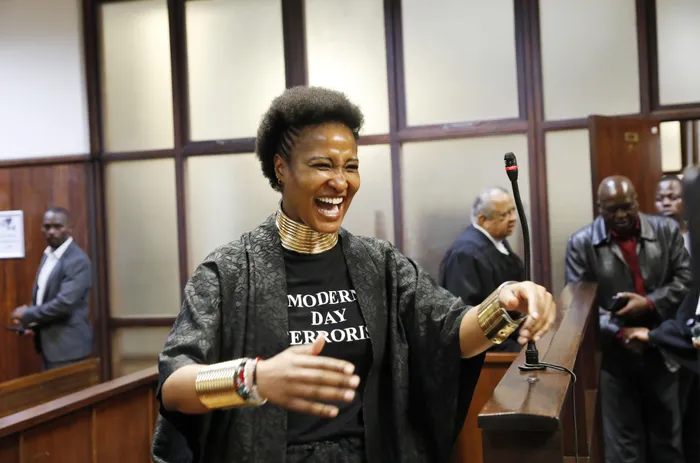WATCH | Duduzile Zuma-Sambudla back in court over July 2021 unrest

The daughter of former President Jacob Zuma, Duduzile Zuma-Sambudla has returned to the Durban High Court on Tuesday morning for her two-week trial, where she faces charges linked to the deadly July 2021 unrest.
Image: Doctor Ngcobo/Independent Newspapers
The daughter of former President Jacob Zuma, Duduzile Zuma-Sambudla has returned to the Durban High Court on Tuesday morning for her two-week trial, where she faces charges linked to the deadly July 2021 unrest that left more than 300 people dead.
On Tuesday, Zuma-Sambudla through her attorney Advocate Dali Mpofu, SC, denied playing any role in instigating the violence that erupted following her father’s imprisonment.
She appeared in good spirits, smiling as proceedings began.
The state alleges that Zuma-Sambudla used her social media account on X, formerly Twitter, to incite unrest that caused extensive damage, particularly in KwaZulu-Natal.
She faces three charges - incitement to commit terrorism, incitement to commit violence, and contravening the Riotous Assemblies Act of 1956.
Prosecutors claim that between June 29 and July 2021, she unlawfully encouraged others to commit acts of terrorism and violence by posting messages and videos that allegedly glorified the destruction.
The state’s first witness, Major General Gopal Gounden of the Directorate for Priority Crime Investigation (the Hawks), testified that investigators identified three X accounts, one of which was verified as belonging to Zuma-Sambudla.
The other two were fake accounts containing misspellings of her name.
Gounden said the verified account was allegedly used to post 19 tweets showing looting and unrest.
Some of the posts were captioned “We see you” or “I see you,” which, according to prosecutors, gave the impression of endorsement.
“As I indicated in paragraph 28, the accused published 19 tweets containing videos showing widespread looting,” Gounden told the court.
“Some captions, when placed in the context of this unprecedented uprising, changed the meaning when coming from a person of influence.”
Mpofu challenged the witness, arguing that the tweets did not amount to incitement and that others had posted similar content without being charged.
Gounden admitted that no other users were prosecuted for sharing the same images, saying,
“There was no need to charge someone purely for sharing a picture. But the caption added by the accused gave credence to the image itself.”
Mpofu later dismissed Gounden’s testimony as “completely unhelpful” to the state’s case.
Gounden detailed how the unrest spiraled into looting, arson, murder, and destruction of property after Zuma handed himself over to authorities on July 7, 2021.
Investigators, he said, discovered that coordination of the violence took place largely through social media platforms, including at least 164 WhatsApp groups created to organize and direct participants.
Eight main groups were identified as key coordination hubs, including “INK Shutdown,” “eThekwini Shutdown,” and “3 Zuma Coordinators.”
“These groups allegedly linked national-level instructions to local “ground forces.”
“It shows that high-level information was filtered to provincial levels and disseminated to ground forces,” Gounden said.
The trial continues.
IOL